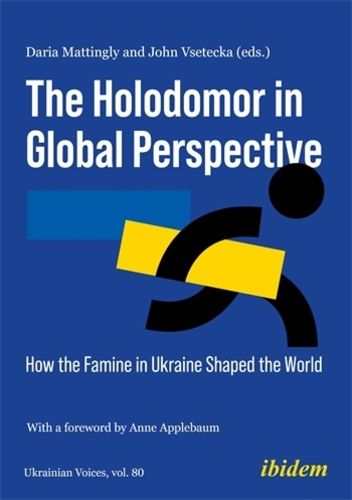Readings Newsletter
Become a Readings Member to make your shopping experience even easier.
Sign in or sign up for free!
You’re not far away from qualifying for FREE standard shipping within Australia
You’ve qualified for FREE standard shipping within Australia
The cart is loading…






Between 1932 and 1933, millions of people in Ukraine died of forced starvation. The famine, now known as the Holodomor, became one of the most deplorable acts in the history of the Soviet Union and the wider twentieth century. The Holodomor occupies an important place in Ukrainian and Soviet history, but less is known about the famine's role in world history. Much has been written about the intents behind the famine, its genocidal particulars, and the effects of the famine within the borders of Ukraine. Still, a significantly smaller amount of work has examined how the Holodomor affected and was affected by global economics, politics, and international relations during the 1930s. The famine was covered in hundreds of press reports worldwide and debated and discussed by governments and world leaders. It became a crisis that captured the attention of foreign observers on every continent.
This collected volume is the first to address the history of the Holodomor from a global perspective. The chapters present perspectives on famine from a multidisciplinary approach that enables us to reckon with the global implications of mass starvation in Ukraine from 1932 to 1933 and to understand them on a scale that transcends the borders of Ukraine and the Soviet Union. This book results from the germination of ideas that the contributors first presented to a conference at the University of Cambridge in 2022. They include, in alphabetical order, Roser Alvarez Klee, Olga Andriewsky, Ray Gamache, Ola Hnatiuk, Bohdan Klid, Andriy Kohut, Wiktoria Kudela-Swiatek, Sara Nesteruk, Matthew Pauly, Henry Prown, Yuri Shapoval, Iryna Skubii, Atanas Terleckas, Serhy Yekelchyk, and Larysa Zasiekina.
$9.00 standard shipping within Australia
FREE standard shipping within Australia for orders over $100.00
Express & International shipping calculated at checkout
Between 1932 and 1933, millions of people in Ukraine died of forced starvation. The famine, now known as the Holodomor, became one of the most deplorable acts in the history of the Soviet Union and the wider twentieth century. The Holodomor occupies an important place in Ukrainian and Soviet history, but less is known about the famine's role in world history. Much has been written about the intents behind the famine, its genocidal particulars, and the effects of the famine within the borders of Ukraine. Still, a significantly smaller amount of work has examined how the Holodomor affected and was affected by global economics, politics, and international relations during the 1930s. The famine was covered in hundreds of press reports worldwide and debated and discussed by governments and world leaders. It became a crisis that captured the attention of foreign observers on every continent.
This collected volume is the first to address the history of the Holodomor from a global perspective. The chapters present perspectives on famine from a multidisciplinary approach that enables us to reckon with the global implications of mass starvation in Ukraine from 1932 to 1933 and to understand them on a scale that transcends the borders of Ukraine and the Soviet Union. This book results from the germination of ideas that the contributors first presented to a conference at the University of Cambridge in 2022. They include, in alphabetical order, Roser Alvarez Klee, Olga Andriewsky, Ray Gamache, Ola Hnatiuk, Bohdan Klid, Andriy Kohut, Wiktoria Kudela-Swiatek, Sara Nesteruk, Matthew Pauly, Henry Prown, Yuri Shapoval, Iryna Skubii, Atanas Terleckas, Serhy Yekelchyk, and Larysa Zasiekina.